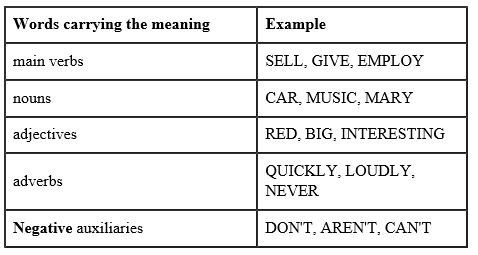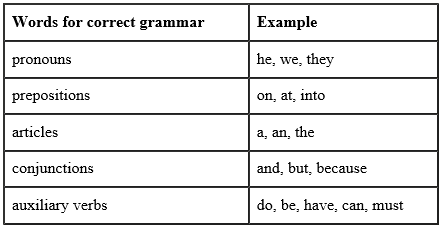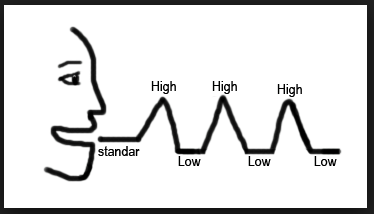
▮ ネイティブらしいイントネーションを身に付ける
IELTSスピーキングは試験管と対面式テストです。 リーディング、ライティングなどと違い、ネイティブスピーカーが目の前にいるために緊張するかもしれません。 しかしマンツーマンでの会話に慣れておくことでむしろリラックスできるようにしたいものです。
試験官は受験者のスピーキング力を判定するために質問をしてきます。 受験者はネイティブ英語に近い英語を話すテクニックを身に付けることで話そのものが自然に上手く聞こえてきます。 正しいイントネーション(強弱)を身に付けることで受験者の英語は試験管に好印象を与えます。
▮ 会話の中での強制(Stress patterns ) – 文の強弱ルールについて
スピーキングテストでは、試験官があなたの話す英語について評価する際、他の受験者と比較するわけではありません。あくまでもネイティブスピーカーと比較することになります。 言語によって違いはありますが、とりわけ日本語は文の中の一つひとつの単語の強弱がほとんどありません。 それに引き換え英語では、文の単語の重要性により強弱を付けます。 ネイティブスピーカーである試験からするとこの英語の強弱(stress ) が大変気になるところなのです。
Stress rule ( 強弱)
1.Content words (内容語)の基本
Content wordsは通常強く発声する単語になります。、名詞、動詞、形容詞、副詞 となります。聞き手に話の内容をイメージさせたり、伝えたい主な内容になります。 私たちは、聞き手に話の内容を早く理解してもらおうとします。そこで、聞き手にわかり易いようにcontent words を強く発音するのです。
Content words (内容語)の例
2. Function words ( 機能語)
Function wordsは通常強く発声しない単語になります。文章を文法的に正しく構成するために必要な単語です。 代名詞、前置詞、冠詞、接続詞、補助動詞がそれに当たります。
Function words は強く発声しませんが、使い方を間違えたり、言い忘れたりすると、英語レベルが疑われてしまいます。
例 ; I CHOOSE to SEE all that is INTERESTING and BEAUTIFUL.
Exceptions (例外)
上のルールは通常の強弱ルールですが、時には例外的に、伝えたい単語がFunction wordであったりします。
例:
“They’ve been to Mongolia, haven’t they?” “No, THEY haven’t, but WE have.
Compared to the listening and writing portions, the speaking test is one of the most anxiety-provoking parts of the IELTS exam. This could be due to the fact that non-native English speakers are afraid of face-to-face encounters with native English speakers, especially if they are outside a social context. Most candidates feel intimidated when speaking with a foreign examiner in English. Remember the speaking exam is about assessing your English-speaking skills. It is nothing personal. You will be speaking to a professional so you have to be professional as well.
Apply the stress rule while speaking English. Your English might be better than your classmate, but the IELTS examiner is not going to compare your English with the person sitting beside. In fact they are going to compare your English to a native speaker of English language.
The basic rules of sentence stress are:
-
content words are stressed
-
structure words are unstressed
-
the time between stressed words is always the same
Example of Content words – stressed
| Words carrying the meaning | Example |
| main verbs | SELL, GIVE, EMPLOY |
| nouns | CAR, MUSIC, MARY |
| adjectives | RED, BIG, INTERESTING |
| adverbs | QUICKLY, LOUDLY, NEVER |
| Negative auxiliaries | DON’T, AREN’T, CAN’T |
Example of Structure words – unstressed
| Words for correct grammar | Example |
| pronouns | he, we, they |
| prepositions | on, at, into |
| articles | a, an, the |
| conjunctions | and, but, because |
| auxiliary verbs | do, be, have, can, must |
Exceptions
The above rules are for for what is called “neutral” or normal stress. But sometimes we can stress a word that would normally be only a structure word, for example to correct information. Look at the following dialogue:
“They’ve been to Mongolia, haven’t they?”
“No, THEY haven’t, but WE have.
Note also that when “be” is used as a main verb, it is usually unstressed (even though in this case it is a content word).
Speak clearly. There are some people who start speaking English as if they are in a race. All these people say the wrong things and they are not able to connect their ideas in a correct manner. Please refrain from this kind of activity. You will not even be able to speak you native language in a proper way if you speaking so quickly.
Question:
One of the 4 criteria the IELTS Speaking is assessed on is fluency and coherence. What does this mean?
a. This refers to how good the candidate is at keeping talking at the right speed and how good they are at connecting their ideas together.
b. This refers to how much vocabulary the candidate has and how well they use it.
c. This refers to how many structures the candidate has and how well they use them.















